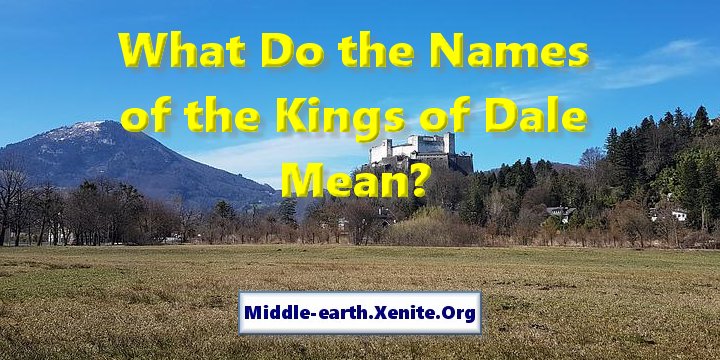
Q: What Do the Names of the Kings of Dale Mean?
ANSWER: The names of the Kings of Dale all appear to have been drawn from Old Norse. In The Peoples of Middle-earth, Christopher Tolkien wrote the following commentary in the chapter dealing with the LoTR “Appendix on Languages”:
Central to the ‘fiction of authenticity’ is of course the Common Speech. I concluded that this was first named in the Lord of the Rings papers in the chapter Lothlorien (dating from the beginning of the 1940s): see VII.223, 239. In the second of these passages my father wrote that the speech of the wood-elves of Lorien was ‘not that of the western elves which was in those days used as a common speech among many folk’. In a note of the same period (VII.277) he said that ‘Since Aragorn is a man and the common speech (especially of mortals) is represented by English, then he must not have an Elvish name’; and in another note (VII.424), one of a collection of jottings on a page that bears the date 9 February 1942 (at which time he was working on the opening chapters of what became The Two Towers) he wrote:
Language of Shire = modern English
Language of Dale = Norse (used by Dwarves of that region)
Language of Rohan = Old English
‘Modern English’ is lingua franca spoken by all people (except a few secluded folk like Lorien) – but little and ill by orcs.In this, ‘Language of Dale = Norse (used by Dwarves of that region)’ shows plainly that a major obstacle, perhaps the chief obstacle, to a coherent ‘authentication’ had by this time been resolved. When my father wrote The Hobbit he had of course no notion that the Old Norse names of the Dwarves required any explanation, within the terms of the story: those were their names, and that was all there was to it. As he said in a letter of December 1937, cited in the Foreword to The Return of the Shadow (p. 7): ‘I don’t much approve of The Hobbit myself, preferring my own mythology (which is just touched on) with its consistent nomenclature … and organized history, to this rabble of Eddaic-named dwarves out of Voluspa …’ But now this inescapable Norse element had to be accounted for; and from that ‘rabble of Eddaic-named dwarves out of Voluspa the conception emerged that the Dwarves had ‘outer names’ derived from the tongues of Men with whom they had dealings, concealing their true names which they kept altogether secret. And this was very evidently an important component in the theory of the transposition of languages: for the Dwarves had Norse names because they lived among Men who were represented in The Lord of the Rings as speaking Norse. It may not be too far-fetched, I think, to suppose that (together with the idea of the Common Speech) those Dwarf-names in The Hobbit provided the starting-point for the whole structure of the Mannish languages in Middle-earth, as expounded in the present text.
As I have already shown, the name of “Girion” is probably adapted from Old Norse Geirr (“spear”). In that same article I identified “Bard” with Old Norse barði (a high-prowed ship) or bardr (“protection from strife”), “Bain” with Old Norse beinn (“leg”), and “Brand” with Old Norse brandr (“sword, blade”).
Some alternative meanings for “Bain” might include bein (“bone”), beina (“assist”), and beini (“help”, “benefit”). Some people suggest that “Bain” might be derived from Old English bane (“killer”); an Old Norse cognate is bana. There is certainly an Old Norse word ben that means “wound” but neither word sounds very kingly.
People sometimes ask if Tolkien could have devised other names for Kings of Dale that would have sounded like these names. Old Norse certainly had many one-syllable words that could be used as names but Tolkien also used a fair number of them for Dwarf names. Dwarves, of course, were also given some two-syllable names (Balin, Fili, Kili, Fundin to name a few). But what about names for Men?
If you’re writing fan fiction or developing a campaign set in or around the Kingdom of Dale, here are a few words you may want to consider using in place- and personal names:
- And(i) (“spirit”)
- Armad(r) (“steward”)
- Blár (“blue,black”)
- Borg (“town”)
- Brýnn (“urgent”)
- Bryt(i) (“steward”)
- Dreng(r) (“warrior”)
- Fadir,Faðir (“father”)
- Fell (“hill,mountain”)
- Flyot,Fljót (“river”)
- Flyot(r),Fljót(r) (“swift”)
- Folk (“people”)
- Fram(i) (“fame,courage”)
- Frœð(i),Frad(i),Fradh(i) (“lore,magic”)
- Gram(r) (“king”)
- Grár (“grey”)
- Hard,Hardh,Harð (“hard”)
- Heim,Heim(a) (“home”)
- Heim(r) (“region”)
- Hest(r) (“stallion”)
- Hjalm(r) (“helmet”)
- Hjord (“herd”)
- Kastal(i) (“castle”)
- Land (“land,country”>
- Lið(r),Lid(r),Lidh(r) (“people,men”)
- Mað(r),Mad(r),Madh(r) (“man”)
- Maerr (“noble,glorious,famous”)
- Orka (“strength,might”)
- Riddar(i) (“horseman”)
- Raudh(r),Rauð(r) (“red”)
- Skjalm(r) (“shield”)
- Stallar(i) (“marshal”)
- Steinn (“stone”)
- Storr (“great,huge”)
- Thengill (“king,lord”)
- Thiod (“nation,race,people”)
- Vald (“power,control”)
- Van (“hope”)
- Vard(r) (“guard”)
- Vask(r) (“brave,gallant”)
- Vatn (“lake,waterway”)
- Við(r),Vid(r) (“forest,wood”)
- Vís(i) (“prince,leader”)
# # #
Have you read our other Tolkien and Middle-earth Questions and Answers articles?
